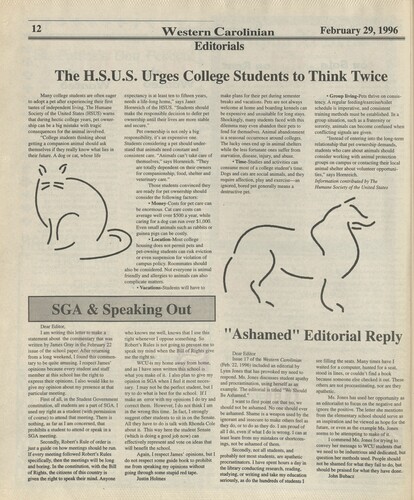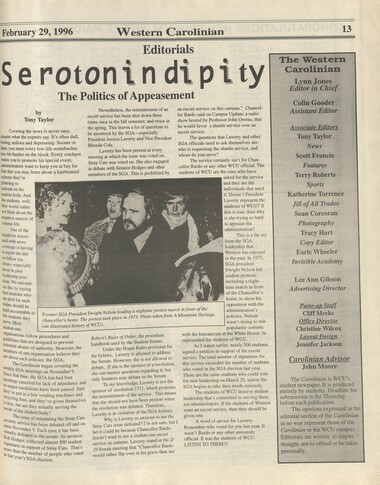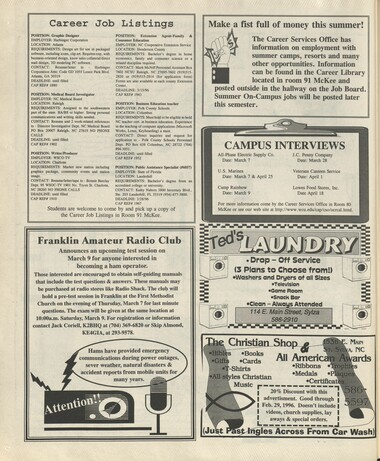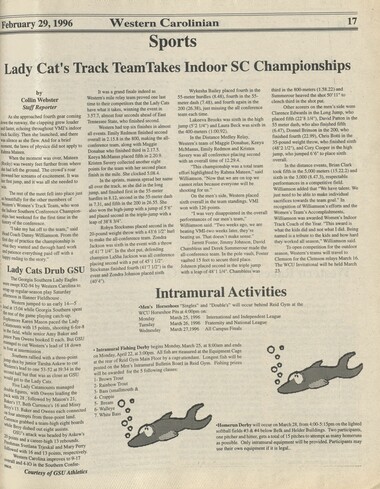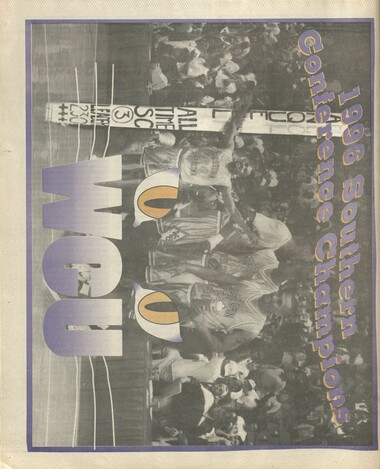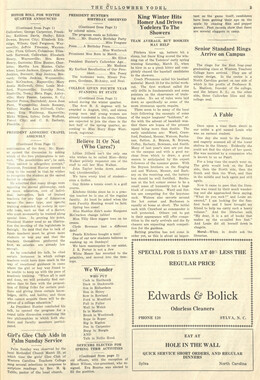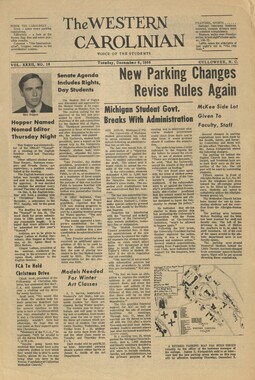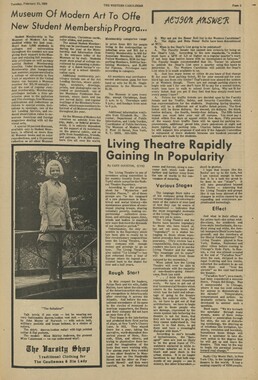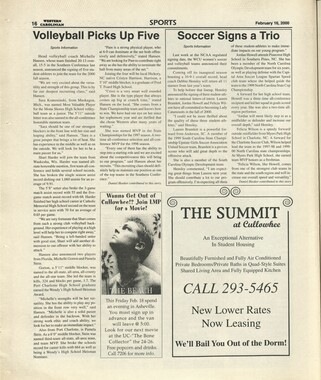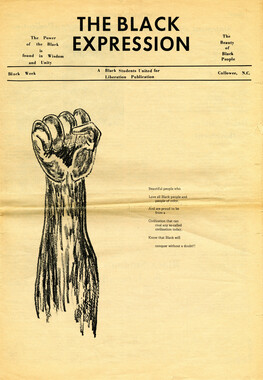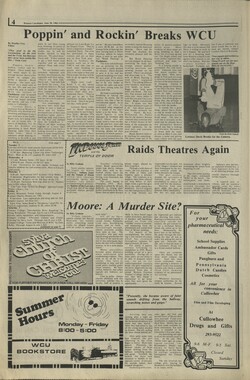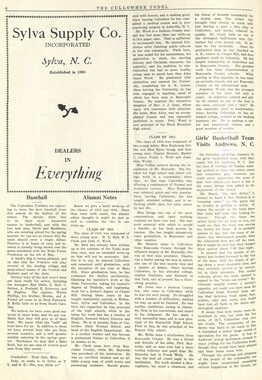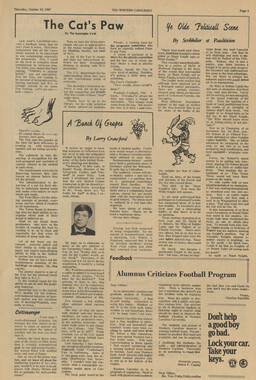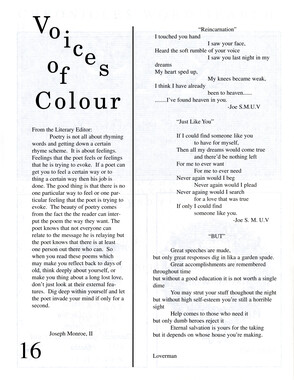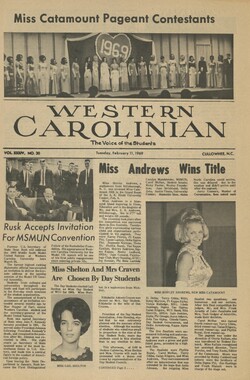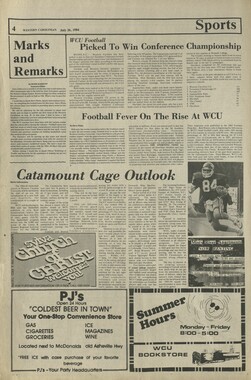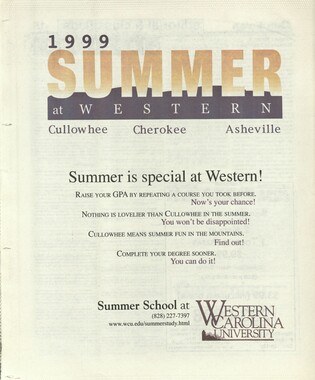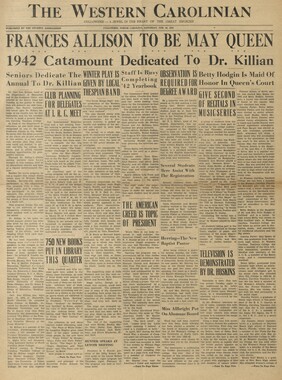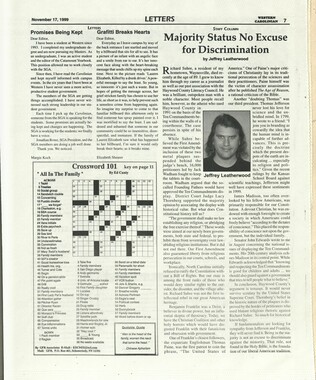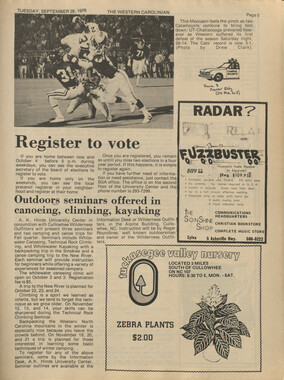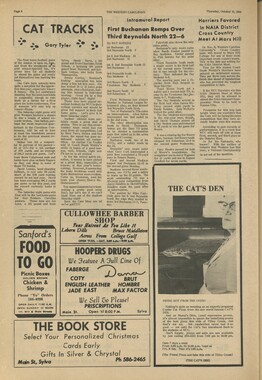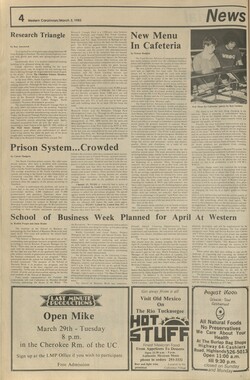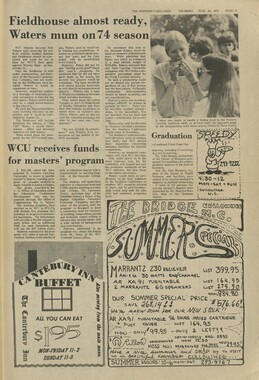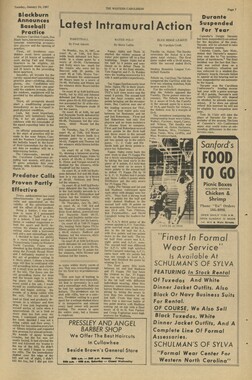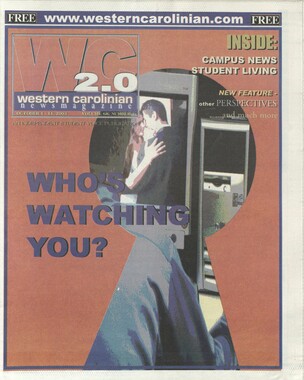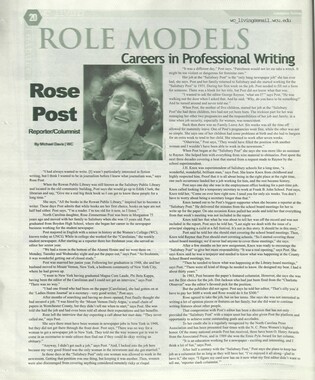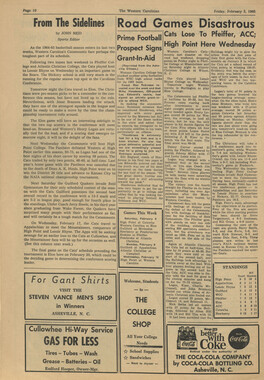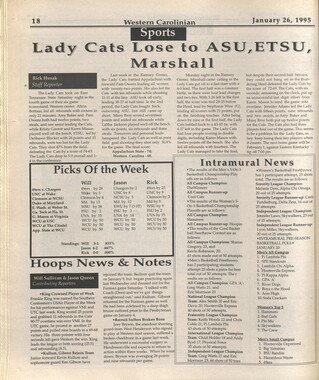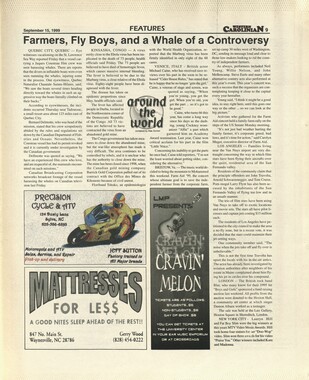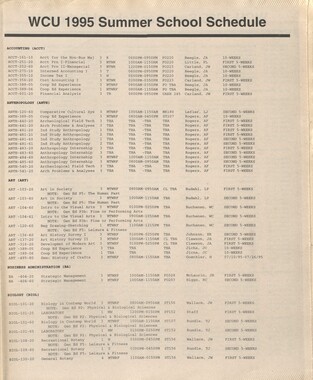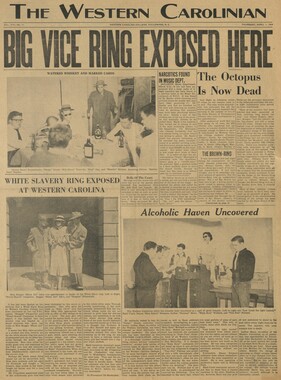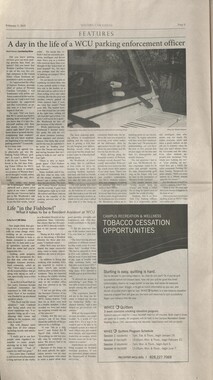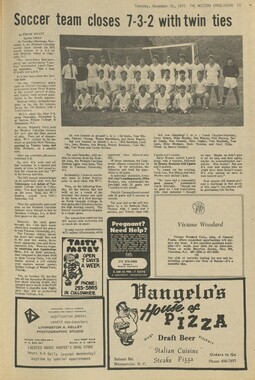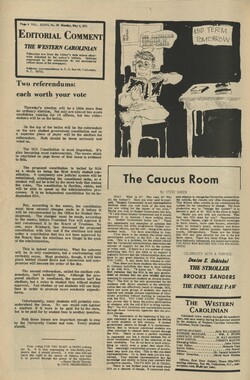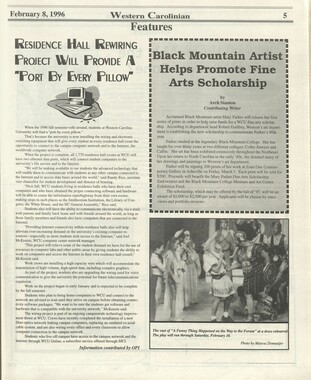Western Carolina University (21)
View all
- Canton Champion Fibre Company (2308)
- Cherokee Traditions (291)
- Civil War in Southern Appalachia (165)
- Craft Revival (1942)
- George Masa Collection (137)
- Great Smoky Mountains - A Park for America (3080)
- Highlights from Western Carolina University (422)
- Horace Kephart (973)
- Journeys Through Jackson (159)
- LGBTQIA+ Archive of Jackson County (89)
- Oral Histories of Western North Carolina (318)
- Picturing Appalachia (6617)
- Stories of Mountain Folk (413)
- Travel Western North Carolina (153)
- Western Carolina University Fine Art Museum Vitreograph Collection (129)
- Western Carolina University Herbarium (92)
- Western Carolina University: Making Memories (738)
- Western Carolina University Publications (2491)
- Western Carolina University Restricted Electronic Theses and Dissertations (146)
- Western North Carolina Regional Maps (71)
- World War II in Southern Appalachia (131)
University of North Carolina Asheville (6)
View all
- Allanstand Cottage Industries (62)
- Appalachian National Park Association (53)
- Bennett, Kelly, 1890-1974 (1463)
- Berry, Walter (76)
- Brasstown Carvers (40)
- Carver, George Washington, 1864?-1943 (26)
- Cathey, Joseph, 1803-1874 (1)
- Champion Fibre Company (233)
- Champion Paper and Fibre Company (297)
- Cherokee Indian Fair Association (16)
- Cherokee Language Program (22)
- Crowe, Amanda (40)
- Edmonston, Thomas Benton, 1842-1907 (7)
- Ensley, A. L. (Abraham Lincoln), 1865-1948 (275)
- Fromer, Irving Rhodes, 1913-1994 (70)
- George Butz (BFS 1907) (46)
- Goodrich, Frances Louisa (120)
- Grant, George Alexander, 1891-1964 (96)
- Heard, Marian Gladys (60)
- Kephart, Calvin, 1883-1969 (15)
- Kephart, Horace, 1862-1931 (313)
- Kephart, Laura, 1862-1954 (67)
- Laney, Gideon Thomas, 1889-1976 (439)
- Masa, George, 1881-1933 (61)
- McElhinney, William Julian, 1896-1953 (44)
- Niggli, Josephina, 1910-1983 (10)
- North Carolina Park Commission (105)
- Osborne, Kezia Stradley (9)
- Owens, Samuel Robert, 1918-1995 (11)
- Penland Weavers and Potters (36)
- Roberts, Vivienne (15)
- Roth, Albert, 1890-1974 (142)
- Schenck, Carl Alwin, 1868-1955 (1)
- Sherrill's Photography Studio (2565)
- Southern Highland Handicraft Guild (127)
- Southern Highlanders, Inc. (71)
- Stalcup, Jesse Bryson (46)
- Stearns, I. K. (213)
- Thompson, James Edward, 1880-1976 (226)
- United States. Indian Arts and Crafts Board (130)
- USFS (683)
- Vance, Zebulon Baird, 1830-1894 (1)
- Weaver, Zebulon, 1872-1948 (58)
- Western Carolina College (230)
- Western Carolina Teachers College (282)
- Western Carolina University (2008)
- Western Carolina University. Mountain Heritage Center (18)
- Whitman, Walt, 1819-1892 (10)
- Wilburn, Hiram Coleman, 1880-1967 (73)
- Williams, Isadora (3)
- Cain, Doreyl Ammons (0)
- Crittenden, Lorraine (0)
- Rhodes, Judy (0)
- Smith, Edward Clark (0)
- Appalachian Region, Southern (3032)
- Asheville (N.C.) (1945)
- Avery County (N.C.) (26)
- Blount County (Tenn.) (195)
- Buncombe County (N.C.) (1680)
- Cherokee County (N.C.) (283)
- Clay County (N.C.) (556)
- Graham County (N.C.) (238)
- Great Smoky Mountains National Park (N.C. and Tenn.) (525)
- Haywood County (N.C.) (3573)
- Henderson County (N.C.) (70)
- Jackson County (N.C.) (4925)
- Knox County (Tenn.) (35)
- Knoxville (Tenn.) (13)
- Lake Santeetlah (N.C.) (10)
- Macon County (N.C.) (421)
- Madison County (N.C.) (216)
- McDowell County (N.C.) (39)
- Mitchell County (N.C.) (135)
- Polk County (N.C.) (35)
- Qualla Boundary (982)
- Rutherford County (N.C.) (78)
- Swain County (N.C.) (2185)
- Transylvania County (N.C.) (270)
- Watauga County (N.C.) (12)
- Waynesville (N.C.) (86)
- Yancey County (N.C.) (72)
- Aerial Photographs (3)
- Aerial Views (60)
- Albums (books) (4)
- Articles (1)
- Artifacts (object Genre) (228)
- Bibliographies (1)
- Biography (general Genre) (2)
- Cards (information Artifacts) (38)
- Clippings (information Artifacts) (192)
- Copybooks (instructional Materials) (3)
- Crafts (art Genres) (622)
- Depictions (visual Works) (21)
- Design Drawings (1)
- Digital Moving Image Formats (2)
- Drawings (visual Works) (185)
- Envelopes (101)
- Exhibitions (events) (1)
- Facsimiles (reproductions) (1)
- Fiction (general Genre) (4)
- Financial Records (12)
- Fliers (printed Matter) (67)
- Glass Plate Negatives (381)
- Guidebooks (2)
- Internegatives (10)
- Interviews (823)
- Land Surveys (102)
- Letters (correspondence) (1045)
- Manuscripts (documents) (618)
- Maps (documents) (177)
- Memorandums (25)
- Minutes (administrative Records) (59)
- Negatives (photographs) (6090)
- Newsletters (1290)
- Newspapers (2)
- Notebooks (8)
- Occupation Currency (1)
- Paintings (visual Works) (1)
- Pen And Ink Drawings (1)
- Periodicals (194)
- Personal Narratives (10)
- Photographs (12977)
- Plans (maps) (1)
- Poetry (6)
- Portraits (4568)
- Postcards (329)
- Programs (documents) (181)
- Publications (documents) (2444)
- Questionnaires (65)
- Relief Prints (26)
- Sayings (literary Genre) (1)
- Scrapbooks (282)
- Sheet Music (2)
- Slides (photographs) (402)
- Songs (musical Compositions) (2)
- Sound Recordings (802)
- Specimens (92)
- Speeches (documents) (18)
- Tintypes (photographs) (8)
- Transcripts (329)
- Text Messages (0)
- A.L. Ensley Collection (275)
- Appalachian Industrial School Records (7)
- Appalachian National Park Association Records (336)
- Axley-Meroney Collection (2)
- Bayard Wootten Photograph Collection (20)
- Bethel Rural Community Organization Collection (7)
- Blumer Collection (5)
- C.W. Slagle Collection (20)
- Canton Area Historical Museum (2110)
- Carlos C. Campbell Collection (462)
- Cataloochee History Project (64)
- Cherokee Studies Collection (4)
- Daisy Dame Photograph Album (5)
- Daniel Boone VI Collection (1)
- Doris Ulmann Photograph Collection (112)
- Elizabeth H. Lasley Collection (1)
- Elizabeth Woolworth Szold Fleharty Collection (4)
- Frank Fry Collection (95)
- George Masa Collection (173)
- Gideon Laney Collection (452)
- Hazel Scarborough Collection (2)
- Hiram C. Wilburn Papers (28)
- Historic Photographs Collection (236)
- Horace Kephart Collection (861)
- Humbard Collection (33)
- Hunter and Weaver Families Collection (1)
- I. D. Blumenthal Collection (4)
- Isadora Williams Collection (4)
- Jesse Bryson Stalcup Collection (47)
- Jim Thompson Collection (224)
- John B. Battle Collection (7)
- John C. Campbell Folk School Records (80)
- John Parris Collection (6)
- Judaculla Rock project (2)
- Kelly Bennett Collection (1482)
- Love Family Papers (11)
- Major Wiley Parris Civil War Letters (3)
- Map Collection (12)
- McFee-Misemer Civil War Letters (34)
- Mountain Heritage Center Collection (4)
- Norburn - Robertson - Thomson Families Collection (44)
- Pauline Hood Collection (7)
- Pre-Guild Collection (2)
- Qualla Arts and Crafts Mutual Collection (12)
- R.A. Romanes Collection (681)
- Rosser H. Taylor Collection (1)
- Samuel Robert Owens Collection (94)
- Sara Madison Collection (144)
- Sherrill Studio Photo Collection (2558)
- Smoky Mountains Hiking Club Collection (616)
- Stories of Mountain Folk - Radio Programs (374)
- The Reporter, Western Carolina University (510)
- Venoy and Elizabeth Reed Collection (16)
- WCU Gender and Sexuality Oral History Project (36)
- WCU Mountain Heritage Center Oral Histories (25)
- WCU Oral History Collection - Mountain People, Mountain Lives (71)
- WCU Students Newspapers Collection (1923)
- Western North Carolina Tomorrow Black Oral History Project (69)
- William Williams Stringfield Collection (2)
- Zebulon Weaver Collection (109)
- African Americans (390)
- Appalachian Trail (35)
- Artisans (521)
- Cherokee art (84)
- Cherokee artists -- North Carolina (10)
- Cherokee language (21)
- Cherokee pottery (101)
- Cherokee women (208)
- Church buildings (190)
- Civilian Conservation Corps (U.S.) (111)
- College student newspapers and periodicals (2012)
- Dams (108)
- Dance (1023)
- Education (222)
- Floods (63)
- Folk music (1015)
- Forced removal, 1813-1903 (2)
- Forest conservation (220)
- Forests and forestry (1198)
- Gender nonconformity (4)
- Great Smoky Mountains National Park (N.C. and Tenn.) (181)
- Hunting (47)
- Landscape photography (25)
- Logging (122)
- Maps (83)
- Mines and mineral resources (9)
- North Carolina -- Maps (18)
- Paper industry (38)
- Postcards (255)
- Pottery (135)
- Railroad trains (72)
- Rural electrification -- North Carolina, Western (3)
- School integration -- Southern States (2)
- Segregation -- North Carolina, Western (5)
- Slavery (5)
- Sports (452)
- Storytelling (243)
- Waterfalls -- Great Smoky Mountains (N.C. and Tenn.) (66)
- Weaving -- Appalachian Region, Southern (280)
- Wood-carving -- Appalachian Region, Southern (328)
- World War, 1939-1945 (173)
Western Carolinian Volume 61 Number 18
Item
Item’s are ‘child’ level descriptions to ‘parent’ objects, (e.g. one page of a whole book).
-
-
12 Western Carolinian February 29,1996 Editorials The H.S.U.S. Urges College Students to Think Twice Many college students are often eager to adopt a pet after experiencing their first tastes of independent living. The Humane Society of the United States (HSUS) warns that during hectic college years, pet ownership can be a big mistake with tragic consequences for the animal involved. "College students thinking about getting a companion animal should ask themselves if they really know what lies in their future. A dog or cat, whose life fr 0 expectancy is at least ten to fifteen years, needs a life-long home," says Janet Hornreich of the HSUS. "Students should make the responsible decision to defer pet ownership until their lives are more stable and secure." Pet ownership is not only a big responsibility, it's an expensive one. Students considering a pet should understand that animals need constant and consistent care. "Animals can't take care of themselves," says Hornreich. "They are totally dependent on their owners for companionship, food, shelter and veterinary care." Those students convinced they are ready for pet ownership should consider the following factors: • Money-Costs for pet care can be enormous. Cat care costs can average well over $500 a year, while caring for a dog can run over $1,000. Even small animals such as rabbits or guinea pigs can be costly. • Location-Most college housing does not permit pets and pet-owning students can risk eviction or even suspension for violation of campus policy. Roommates should also be considered. Not everyone is animal friendly and allergies to animals can also complicate matters. • • Vacations-Students will have to SGA & Speaking Out 1 Dear Editor, I am writing this letter to make a statement about the commentary that was written by James Gray in the February 22 issue of the school paper. After returning from a long weekend, I found this commentary to be quite amusing. I respect James' opinions because every student and staff member at this school has the right to express their opinions. I also would like to give my opinion about my presence at that particular meeting. First of all, in the Student Government constitution, all students are a part of SGA. I used my right as a student (with permission of course) to attend that meeting. There is nothing, as far as I am concerned, that prohibits a student to attend or speak in a SGA meeting. Secondly, Robert's Rule of order is just a guide on how meetings should be run. If every meeting followed Robert's Rules specifically, then the meetings will be long and boring. In the constitution, with the Bill of Rights, the citizens of this country is given the right to speak their mind. Anyone who knows me well, knows that I use this right whenever I oppose something. So Robert's Rules is not going to prevent me to speak my mind when the Bill of Rights give me the right to. WCU is my home away from home, and as I have seen written this school is what you make of it. I also plan to give my opinion in SGA when I feel it most necessary. I may not be the perfect student, but I try to do what is best for the school. If I make an error with my opinions I do try and correct them. However, I do not think I am in the wrong this time. In fact, I strongly suggest other students to sit in on the Senate. All they have to do is talk with Rhonda Cole about it. This way here the student Senate (which is doing a good job now) can effectively represent and vote on ideas that will benefit the school. Again, I respect James' opinions, but I do not respect some guide book to prohibit me from speaking my opinions without going through some stupid red tape. Justin Holmes make plans for their pet during semester breaks and vacations. Pets are not always welcome at home and boarding kennels can be expensive and unsuitable for long stays. Shockingly, many students faced with this dilemma may even abandon their pets to fend for themselves. Animal abandonment is a seasonal occurrence around colleges. The lucky ones end up in animal shelters while the less fortunate ones suffer from starvation, disease, injury, and abuse. • Time-Studies and activities can consume most of a college student's time. Dogs and cats are social animals, and they require affection, play and exercise—an ignored, bored pet generally means a destructive pet. • Group living-Pets thrive on consistency. A regular feeding/exercise/toilet schedule is imperative, and consistent training methods must be established. In a group situation, such as a fraternity or sorority, animals can become confused when conflicting signals are given. "Instead of entering into the long-term relationship that pet ownership demands, students who care about animals should consider working with animal protection groups on campus or contacting their local animal shelter about volunteer opportunities," says Hornreich. Information contributed by The Humane Society of the United States "Ashamed" Editorial Reply Dear Editor Issue 17 of the Western Carolinian (Feb. 22, 1996) included an editorial by Lynn Jones that has provoked my need to respond. Ms. Jones discusses student apathy and procrastination, using herself as an example. The editorial is titled "We Should Be Ashamed." I want to first point out that no, we should not be ashamed. No one should ever be ashamed. Shame is a weapon used by the ignorant and insecure to make others feel as they do, or to do as they do. I am proud of all I do, even if what I do is wrong. I can at least learn from my mistakes or shortcomings, not be ashamed of them. Secondly, not all students, and probably not most students, are apathetic procrastinators. I have spent hours a day in the library conducting research, reading, studying, or writing and take my education seriously, as do the hundreds of students I see filling the seats. Many times have I waited for a computer, hunted for a seat, stood in lines, or couldn't find a book because someone else checked it out. These others are not procrastinating, nor are they apathetic. Ms. Jones has used her opportunity as an editorialist to focus on the negative and ignore the positive. The letter she mentions from the elementary school should serve as an inspiration and be viewed as hope for the future, or even as the example Ms. Jones seems to be attempting to make of it. I commend Ms. Jones for trying to convey her message to WCU students that we need to be industrious and dedicated, but question her methods used. People should not be shamed for what they fail to do, but should be praised for what they have done. John Bubacz
Object
Object’s are ‘parent’ level descriptions to ‘children’ items, (e.g. a book with pages).
-
The Western Carolinian is Western Carolina University's student-run newspaper. The paper was published as the Cullowhee Yodel from 1924 to 1931 before changing its name to The Western Carolinian in 1933.
-

